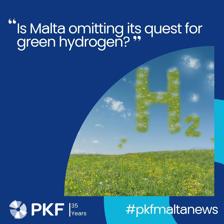Is Malta omitting its quest for green hydrogen?
Author: George Mangion - Senior Partner at PKF Malta
Published on Malta Business Weekly: 14th September 2023

Last week government issued a consultation paper on offshore renewables.
In essence the scope of this Offshore Renewable Energy policy is to enable the government to exploit the offshore potential in the country’s best interest. The announcement falls short of indicating the amount of electricity generated as requested by the government and if there is scope for any excess energy to be exported.
As can be expected an analysis is to indicate the future growth of offshore renewable (wind) power in Europe, and the speed of growth will be driven by two main factors:
- The cost competitiveness of energy production by the offshore wind industry; and
- The level of policy support for the development of renewable energy in Europe. At no stage does the consultation document mention the generation and use of green hydrogen using electrolysis.
Offshore solar
The possibility of looking at solar PV technology offshore is also an area of interest for Malta. A large number of installation projects, using floating photovoltaic systems (FPVs) technology, have been operated in water bodies such as lakes and dams/reservoirs. However, deployment of FPVs offshore is still limited because of the existing characteristics of marine/sea environments which are different from onshore conditions, such as wind loads and wave loads.
The good news for investors is that the government will establish a one-stop-shop that will act as a single point of reference for project developers to be guided through the permitting process necessary to construct and operate the offshore project.
A single administrative unit will be responsible for this procedure and it may act independently or involve other administrative authorities in the process. This design increases the transparency of the process and ultimately saves time and resources.
The inference is that there will be no use of shallow waters around Hurd’s Bank, which as can be expected, can be the preferred site for floating and seabed rigged wind farms.
There are three options but the preferred model seems to be that the state involvement stops at the zone identification. The government therefore prefers that the chosen developer is responsible for any planning exercises, project developments and actual implementation. There will be an open bid session and investors are chosen based on technical and financial competence and the value of the option fee proposed.
The government expects that the cost of connection with the transmission to the grid has to be financed by the chosen developer. All this is in the light of the European Green deal, which is a transformative agenda to combine policies necessary to tackle climate change, to reverse biodiversity loss and eliminate pollution by moving to a circular economy.
To get there the government pledged to reduce emissions by at least 55% by 2030, compared to 1990 levels. The ultimate priority for the EU is to develop supply of renewable hydrogen.
How can industrial quantities of green hydrogen be obtained? The straight answer is via electrolysis using renewable electricity to split water into hydrogen and oxygen.
The hydrogen is collected and stored in pressured canisters. It is used primarily in industry (in the case of Malta to run power stations), while oxygen is released as the by-product or captured for use for export. The government issued a PMC in May 2022 to encourage investors to submit detailed cost estimates on the necessary equipment needed to start a renewable energy supply from wind and solar, preferably located in offshore waters within the EEZ (exclusive economic zone).
The storage potential of hydrogen is particularly beneficial for power grids as it allows for renewable energy to be kept, not only in large quantities, but any excess to requirements can also be exported to Europe.
Author: George Mangion - Senior Partner at PKF Malta
Published on Malta Business Weekly: 14th September 2023
Get in touch: info@pkfmalta.com
